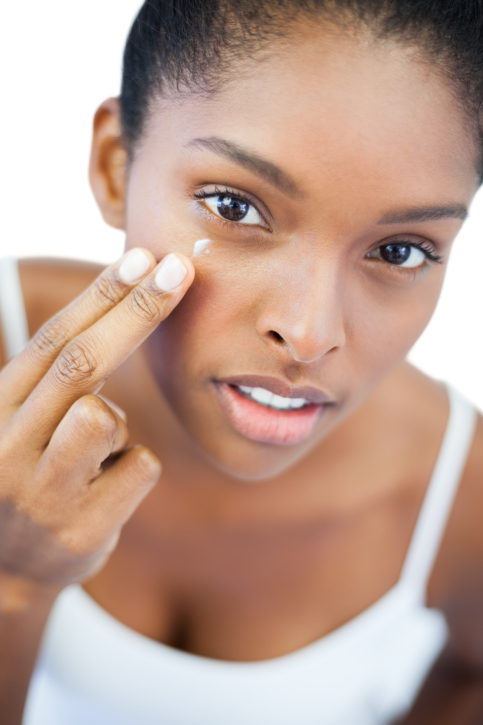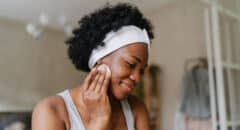
Do you suffer from adult acne? BlackDoctor.org sat down with one of the nation’s leading dermatologists to give us the lowdown on acne. Dr. Jennell Nelson, founder of Nelson Dermatology, provides some helpful information on what acne is, why Black people are predisposed to it and how to best control and cure it.
Dr. Nelson is a board certified fellow of the America Academy of Dermatology with special interests in scarring and ethnic skin disorders. She's been serving the North Virginia community for over 10 years as a clinical dermatologist and skin surgeon, and she also sees Virginia-based patients online at www.DermatologistOnCall.com. Dr. Nelson’s leadership in the field of dermatology has landed her in numerous publications and high ranking amongst the top physicians in America.
She sets the record straight for all those who think only hormonal teens are affected by acne. Grab a pen and paper and get ready to learn something new.
What is acne?
Dr. Nelson: Acne is a skin condition in which pimples, blackheads, whiteheads, and sometimes boils appear on the face and less often, the neck, arms, chest or back. It is caused by overactivity of oil (sebaceous) glands in these areas. This is due to hormones that are released in the body at the onset of puberty. In skin of color, acne lesions lead to hyperpigmentation. It is important to treat acne to maintain a clear skin tone.
Blackheads are caused by plugged pores and turn black due to a reaction between oil in the pores and the air. Bacteria on the skin can cause further redness and irritation of acne. Two of every three teens suffer from some degree of acne, from the onset of puberty until adulthood. Although it is most common in adolescents, it may commonly also occur in adults. Acne is not contagious, and it is not caused by diet, poor hygiene, or sexual thoughts or activity. Your risk of developing acne is higher if you have a family history of acne.
What products or medications cause acne?
Dr. Nelson: Acne can be made worse with the use of some medications including certain birth control pills and testosterone (both hormones); by using certain types of makeup, hair products, soaps and cleansers that irritate the skin; by abrasive or harsh scrubbing; by popping or pinching pimples and blackheads (this forces the oils into the surrounding skin); stress; and for some women, their menstrual cycle.
Prescription medications known to promote acne development include progesterone-based birth control like the Depo-Provera shot or Mirena IUD, topical or oral corticosteroids, lithium, some antiepileptics, and iodides.
An old favorite product, original Noxema, is known to worsen acne. It contains linum usitatissiumum seed oil (linseed) and glycine soja oil (soybean) which are known to promote the clogged pore that can lead to acne.
Is there any type of acne that Blacks are predisposed to?
Dr. Nelson: Pomade acne occurs from the use of oil based products on the hair. Pomade acne was first reported in 1970 in African American men who used scalp creams and oils regularly. It consisted of blackheads and whiteheads (mostly on the temple and forehead). In the original studies, several products were implicated in the acne, including products that contained cocoa butter, mineral oil and Vaseline or other petrolatum-based ingredients. It is thought that the occlusive nature of the pomades was at least partially to blame. Patients with pomade acne are often advised to use hair care products that are non-comedogenic or less comedogenic, such as products that are water or glycerin based.
Dr. Nelson’s three things Black people can do to cure/alleviate their acne?
- Stop using oil based products on the hair and skin that can promote acne. Go with dimethicone-based products for moisturizing the scalp and hair.
- Try an over-the-counter salicylic acid acne wash. Benzoyl peroxide is useful but may cause irritation and hyperpigmentation in skin of color.
- Use a non-comedogenic cleanser and moisturizer like Cetaphil or CeraVe in their facial product lines.
If breakouts are still problematic, you should see your local dermatologist or do an online acne diagnosis. Dermatologists can significantly help when home care or over-the-counter treatments are not resolving acne. There are three basic types of medications that can be prescribed by a dermatologist:
- The topical (applied directly to the skin) retinoid medication, tretinoin (Retin-A), which helps unplug oil ducts and exfoliates the skin to prevent acne, scars and dark spots.
- Other topical antibiotic lotions or creams.
- Antibiotic pills.
Accutane (Isotretinoin) is a very strong medication only used for severe cystic acne and only after all other medications have been tried. This is especially true for women of childbearing age because the effects on the unborn fetus are very severe. Your doctor will discuss this with you in depth if this option is to be considered. Dr. Nelson reserves it for treatment failures and patients suffering over 10 years of acne without sign of resolution.
Wow, that’s a lot to digest. If you know someone who’s suffering in silence with acne, please share this article and encourage them to seek treatment.








